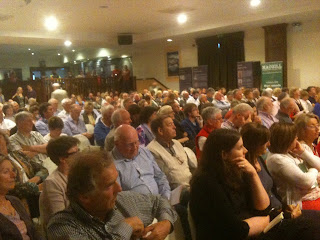Speaking at MacGill Summer School in the Glenties
MacGill worked on the railway line in Scotland and subsequently called the ‘Navvy’s poet’.
He published several volumes of poetry and in 1914 an account of the harsh life of Irish emigrant workers in Scotland. During the 1914-18 war he fought and was wounded as a British soldier. Afterward he continued to write poetry and fiction and drama.
As a tribute to this remarkable individual journalist and producer Joe Mulholland, along with some local people, established a ‘summer school’ in 1981. This isn’t a school of the kind we are all used to. It is a special, different kind of ‘school’ which brings together for one week politicians, journalists, academics, trade unionists, economists, writers, lawyers, community activists, university lecturers, and church leaders to discuss the great issues of the day.
There are other similar ‘schools’ held during the summer months – including one by An Phoblacht.
The MacGill Summer School has an international reputation. So consequently each year the Glenties plays host to a diverse range of contributors.
This year with the centenary of the 1916 Rising only three years away the organisers set as the main theme: Looking to 2016 – How stands the Republic?
I spoke on Wednesday evening in the section entitled – Envisioning a Republic of Justice, Equality and Fairness.
Not surprisingly I nailed my colours to the mast at the outset. This state is not the Republic envisaged by those who wrote the Proclamation. They had a vision for a real republic – a republic of justice, equality and fairness – a republic for all the people of this island.
This is clear when you read the Proclamation. It
addresses Irish men and Irish women. At a time when women didn’t have the vote
this simple address was in itself a progressive statement. Irishmen and
Irishwomen is what it says.
It doesn’t say unless you are gay or unless you are a
traveler or unless you are poor or unless you are disabled.
No. The Proclamation speaks of pursuing the happiness
and prosperity of the whole nation and all its parts; guarantees civil and
religious liberty, and equal rights and equal opportunities; and commits the
republic to cherishing all the children of the nation equally.
It is also impossible to examine this issue without referencing the fact that almost 100 years ago partition created two conservative states ruled in their narrow self-interests by two conservative elites.
The northern state was a one party state which reinforced the institutionalised use of discrimination, sectarianism and segregation. And despite the significant progress arising from the peace process and the Good Friday Agreement the legacy of that structured discrimination and inequality still needs to be tackled in a focussed and systematic way.
Partition also affected the south. This state is the product of the counter-revolution that followed the Rising and of a dreadful civil war which tore out the heart of what remained of the generosity of our national spirit.
As the
idealism of the aborted revolution waned a native conservative elite replaced
the old English elite with little real change in the organisation of Irish
society and no real movement towards a rights based dispensation. Instead conservatism
ruled.
Religion
was hijacked by mean men who used the gospel not to empower but to control, and
narrow moral codes were enforced to subvert the instinctive generosity of our
people. Women were excluded from the workplace and public life; gay and lesbian citizens were denied equality under the law and all the while scandals like the abuse in the industrial schools, the Magdalene laundries, Bethany Home and the barbaric practice of symphysiotomy were tolerated and encouraged.
The
arts were censored. Our language undermined.
Millions fled to England, the USA and Australia. A lesser people would
not have survived.

The real republic that the 1916 leaders fought and died for and which this generation seeks is a republic tolerant of the views, opinions or beliefs of others and is inclusive of all its’ people. It is a republic rooted in the core principles of 1798, of 1916 and the Democratic Programme of the First Dáil.
It is a republic that shares its wealth more equitably, looks after its’ aged and young, provides full rights for people with disabilities, liberates women and delivers the highest standards of public service.
It is a republic that has a sense of itself, will defend and
enhance its language and culture and ensure that equality is the basis on which
it plans, promotes and sustains the
language.
A new Republic for the 21st century must mean equal rights for those in
same sex relationships, ethnic minorities and those of all creeds and none. Equality and fairness must be
at the heart of this.
The
key to building a new republic – a 32 county republic – is to begin now. The
island of Ireland today is in transition. A lot of the old certainties are
gone. Many of the old conservative influences have been weakened. Progress has
been made.We have the opportunity to ensure that justice, equality and fairness are core principles of a new society. We have the opportunity to win real freedom.

.jpg)


Comments